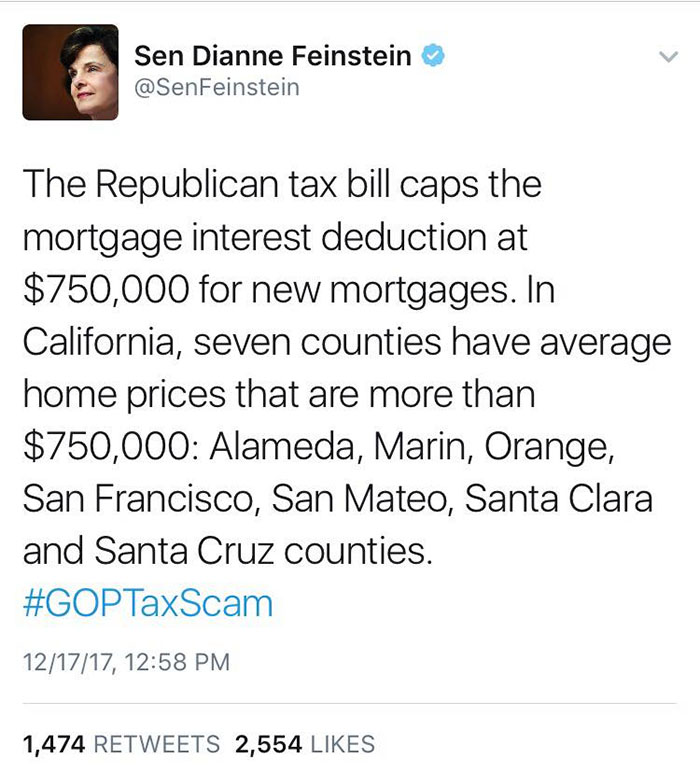As you might imagine, the passage of the GOP tax reform bill in the Senate late last night (it needs one more vote in the House, apparently because of a procedural issue, and that will happen today, before it will go to President Trump’s desk for his signature in the next day or so) has caused the Left to erupt into paroxysms of despair and hysteria. More on that later. In the meantime Sen. John Kennedy (R-Louisiana), who was one of the 51 votes for the bill, put out a rather gleeful press release upon the bill’s successful Senate vote late last night…
U.S. Sen. John Kennedy (R-La.) voted today to pass a once-in-a-generation series of tax cuts. By voting for the bill, Sen. Kennedy made sweeping reforms to America’s antiquated tax code while delivering on his campaign promise to lower taxes and help get the economy moving again.
“This bill helps every single Louisiana family by putting more dollars into their paychecks instead of federal coffers. New jobs get created when families spend those dollars. It’s Economics 101,” said Sen. Kennedy. “We doubled the standard deduction. We more than doubled the child tax credit. We lowered tax rates. I’ve said it before, and I’ll say it again: This bill is about tax cuts, jobs, and more jobs. We have delivered on both. We’ve finally given families and businesses meaningful tax cuts. We’re giving them the tools to dream and to build and to prosper. ”
Highlights from the legislation:
- Increases Take-Home Pay: The typical family of four will receive a tax cut of $2,059.
- Lowers Tax Brackets: The new tax brackets are 10%, 12%, 22%, 24%, 32%, 35%, and 37%.
- Doubles the Standard Deduction: For an individual, the standard deduction goes from $6,350 to $12,700. For a married couple, it goes from $12,000 to $24,000.
- Doubles the Child Tax Credit: The child tax credit is doubled from the current $1,000 to $2,000, and more parents are allowed to claim the credit.
- Repeals Obamacare’s Individual Mandate: Repealing this unpopular tax will help provide additional relief to low- and middle-income families.
- 135,510 people in Louisiana paid the individual mandate tax penalty in 2014 rather than purchase insurance.
- Builds Families: The Adoption Tax Credit is preserved, which ensures that the adoption process remains accessible and affordable.
- Supports Teachers: The Educator Expense Deduction is retained, allowing teachers to claim a deduction for money they spend out of pocket on their classrooms. This tax deduction helps teachers who selflessly spend their own money on school supplies.
- Preserves Historic Tax Credit: By preserving the Historic Tax Credit (HTC), Louisiana’s historic properties and communities will continue to be revitalized and create new economic opportunities.
- Provides A Two Year Boost In GOMESA Funding: Under current estimates, Louisiana will receive an additional $100 million in revenue under the Gulf of Mexico Energy Security Act until 2020 and 2021. This would allow our state to invest in priorities such as coastal restoration and hurricane protection.
Kennedy’s positive review was a little different than that of Democrat House Minority Leader Nancy Pelosi, who is somehow still the head of her party’s caucus. Pelosi was decidedly downcast over the bill’s passage, as you can tell…
The left-leaning Tax Policy Center scored the bill as giving a tax cut to some 80 percent of Americans, with the hardest hit among the losers largely being wealthy leftists from places like New York City, San Francisco, Chicago and Los Angeles (who should rightly be victims of every Republican-inspired tax policy, given the scads of dollars they give to Democrat causes and candidates); those people have been subsidized for decades by federal tax policy which allows them to deduct sky-high state and local income taxes devised by leftist Democrat politicians they funded and voted for, and the bill strips away much of that advantage.
This has led to some rather comical screaming by Democrats suddenly concerned with tax burdens on private citizens, like for example California senator Dianne Feinstein who threw a fit over a reduction in the cap on the federal mortgage interest deduction from onemillion dollars to $750,000…
Back to the positive side, here are a couple of reactions from Louisiana’s Republicans, who have all been enthusiastic supporters of the bill. First, House Majority Whip Steve Scalise was on Martha McCallum’s Fox News show last night touting the bill…
Advertisement
One effect of the bill will be to increase the competition between states for jobs and capital, something that blue states (and Louisiana, whose tax code is set up very much on a blue-state model) will find unpalatable. In New York, the hedge fund industry is considering the stripping away of the federal protections against onerous state and local taxes and looking for the exits…
Wall Street tax expert Robert Willens, president of Robert Willens LLC, has never heard more discussion from wealthy New Yorkers about relocating to another state with a more favorable tax environment until now because of the GOP tax plan.
“Everybody I speak to brings this up. Every NYC resident I speak to asks about the feasibility involved in doing it,” Willens, who regularly advises hedge fund clients on tax matters as it relates to investing, told Yahoo Finance. “I’ve been doing this more than 40 years, and never heard more discussion about relocating than recently.”
The tax plan Congress seems likely to pass soon would severely curtail the deduction for state and local taxes, known as the SALT provision, which about one-third of all taxpayers claim when they file their federal income taxes. In the 43 states with an income tax, the more you earn, the more this tax break is worth, since it lets you lower your taxable income at the federal level by the amount of taxes you pay to the state. Since it also includes property taxes, it also disproportionately benefits people with expensive real estate.
Some wealthy people in states such as New York can easily use the deduction to lower their federal taxable income by $100,000 or more. Congress, however, is poised to cap the total amount of state and local deductions at a mere $10,000. That would push taxable income, or the amount subject to federal tax, way up for people who typically claim a large SALT deduction.
A recent encounter that former hedge fund manager Whitney Tilson, a Democrat and supporter of the “Buffett rule,” had with a hedge fund manager summed up the dismay felt by some in the hedge fund community. Tilson recalled it in an email blast he distributed to his readers.
“I assumed that all of my rich Republican friends would be doing handsprings over this tax ‘plan’ (every study shows that corporations and one-percenters will benefit in a hugely disproportionate way; see here, here and here), especially since the outrageous carried interest loophole (which Trump pledged to close) is maintained, so I was shocked when I ran into an extremely wealthy NYC-based hedge fund manager on Monday and he, unprompted, started railing against it for at least 10 minutes,” Tilson wrote in the email.
Tilson continued: “He believes it will devastate NY (and, to a lesser extent, CA), primarily by ending or severely limiting the deduction of the very high state and local taxes. He estimated that his tax rate (and others [similarly] situated) will go from mid-30% to 56%, which will trigger a massive exodus from NY to places like Florida, which will crush the NYC (and therefore state) economy.”
Oh, well.
If New York and California are devastated by the tax reform bill, they’ll have no choice but to abandon their uncompetitive tax practices and get in the economic game.
That’s a lesson for Louisiana as well, by the way. If the national economy is growing at 1.5 percent and Louisiana grows at 0.5 percent (while Texas is growing at 3 percent), it’s a poor situation and people will gripe about it. But if Louisiana is growing at 1 percent while the national economy is growing at 4 percent and Texas is growing at 6 percent, nobody is griping – they’re just leaving for greener pastures. The state’s politicians, grappling as they are with a “tax reform” package headed in a different direction than the one passing at the federal level today, had better take that into consideration.
Advertisement
Advertisement


